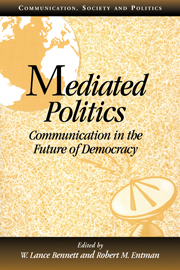Book contents
- Frontmatter
- Contents
- List of Figures
- List of Tables
- Contributors
- Preface
- Acknowledgments
- 1 Mediated Politics: An Introduction
- Part 1 Democracy and the Public Sphere
- Part 2 Citizens, Consumers, and Media in Transition
- Part 3 Mediated Political Information and Public Opinion
- Part 4 Mediated Campaigns
- Part 5 Citizens: Present and Future
- Index
1 - Mediated Politics: An Introduction
Published online by Cambridge University Press: 05 June 2012
- Frontmatter
- Contents
- List of Figures
- List of Tables
- Contributors
- Preface
- Acknowledgments
- 1 Mediated Politics: An Introduction
- Part 1 Democracy and the Public Sphere
- Part 2 Citizens, Consumers, and Media in Transition
- Part 3 Mediated Political Information and Public Opinion
- Part 4 Mediated Campaigns
- Part 5 Citizens: Present and Future
- Index
Summary
Mediated political communication has become central to politics and public life in contemporary democracies. Traditional features of politics persist, from old-fashioned door-to-door campaigning to party and social movement organizing. And people still engage in direct, unmediated political discussion with one another. However, many polities have reached a point where governance, along with a host of related processes such as opinion formation, could not occur in their present forms without various uses of media. Hence the title of this book.
Many of the political changes that ushered in the twenty-first century, from the declining importance of nationalism in most postindustrial democracies, to the shifting patterns of participation within them, are typically linked to media processes, either as causes or as adaptive mechanisms. While some aspects of civic life such as voting, party identification, and national sentiments have eroded in many nations, other activities such as joining causes, protesting unpopular policies, and forming new regional and global communities appear to be on the rise (Inglehart 1997; Archibugi, Held, and Kohler 1998). Political and academic debates question whether changing patterns of participation and identification pose alarming threats to the legitimacy of democratic governments, or whether they are simply routine, even liberating, adjustments to new global social and economic conditions (Bennett 1998; Pool 1990; Putnam 1993, 1995; Rahn and Transue 1998). Answering the core questions about citizen experience in the democratic process increasingly requires understanding the centrality of mediated political communication both in the governing process and in citizen perceptions of society and its problems.
- Type
- Chapter
- Information
- Mediated PoliticsCommunication in the Future of Democracy, pp. 1 - 30Publisher: Cambridge University PressPrint publication year: 2000
- 35
- Cited by



